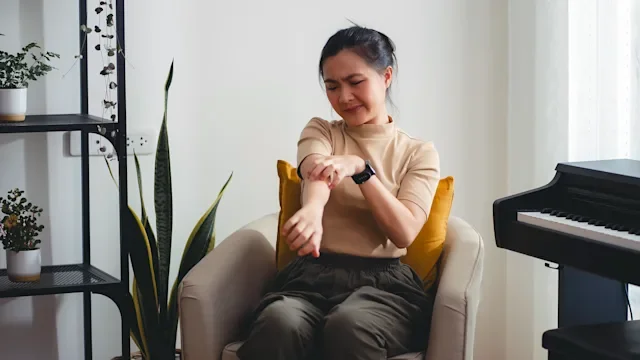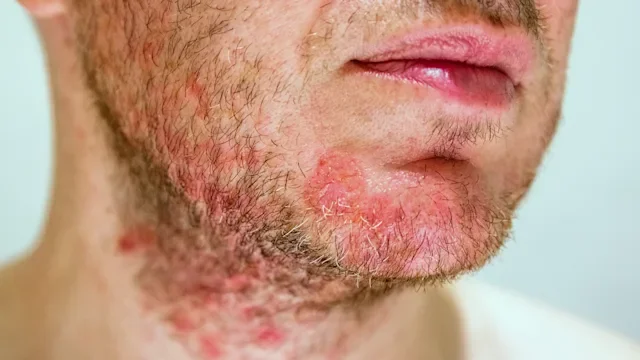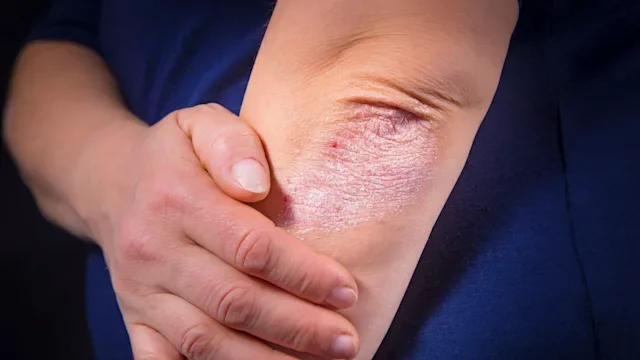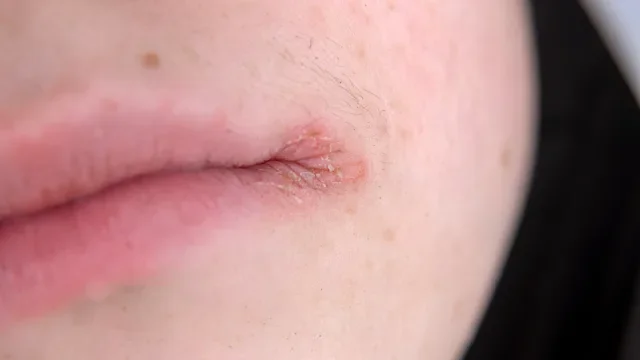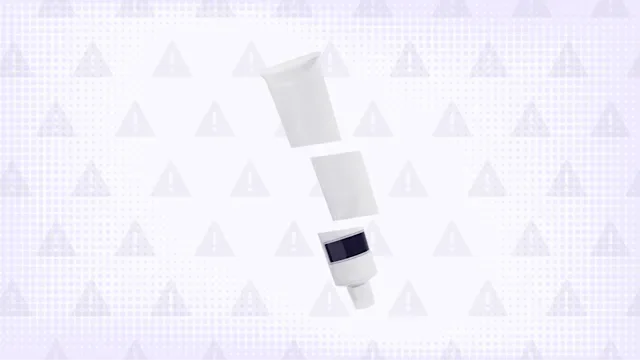Eczema is a chronic skin condition caused by inflammation.
Typical symptoms include a rash, which comes and goes and can cause dry, itchy patches of skin.
Eczema usually shows up in creases of the skin, such as on the back of the neck, eyelids, hands, feet, elbow folds, and the back of the knees.
Eczema is a chronic skin condition characterized by a dry and itchy rash.
The way eczema appears on the skin can differ significantly from person to person. In some cases, it is a mild rash on just one patch of skin, perhaps on the hands, feet, or scalp. But — depending on the type and severity — it can cover the whole body.
Search and compare options
Common features of eczema include red, dry, itch patches of skin that may be scaly or flaky. Sometimes eczema causes small bumps and blisters. Here’s how four people with eczema describe what it’s like.
Flaky, itchy, red skin that oozes and bleeds
Abby Aseo has had eczema since she was 2 months old and has been going to a dermatologist for as long as she can remember.
Abby, who’s now 29 and lives in Los Angeles, says she has used a wide range of injections and steroid creams to treat her eczema over the years. But when she was in college, she recalls, nothing seemed to work. Her eczema made her skin turn bright red. She was self-conscious about the way she looked.

Three years ago, Abby decided to go off of her eczema medication to see if focusing on lifestyle changes would make a difference. Then she began experiencing topical steroid withdrawal. This condition is a common side effect that occurs after stopping steroids.
She says her skin was flaky, red, and itchy. Her hands were oozing pus, and she had to wear cotton gloves at night to keep the skin compressed. She switched to bamboo bed sheets because her polyester sheets made her sweat and itch, then bleed. She didn’t want to go out into public — and often couldn’t, since this happened around the height of the COVID-19 pandemic. She remembers feeling isolated.
She also would have periods of itchiness that lasted for an hour before she was finally able to relax and fall asleep. Eventually, her flare-ups shortened, and she stopped having steroid withdrawal symptoms.
- PrednisoneGeneric Deltasone and Rayos and Sterapred
- MedrolMethylprednisolone
- Fluticasone PropionateGeneric Cutivate and Flonase
While she still has bouts of itchiness, Abby says she has learned more about her triggers, which include certain foods (like eggs and dairy) and stress. Now she sees a therapist to help her mental health and keep her stress levels down. And she takes multivitamins and probiotics, and she started eating a pescetarian diet — adding seafood to her previous vegetarian diet.
She also started posting about her eczema on TikTok. She realized that there were a lot of people going through similar experiences with the condition. She’s now part of a support group on Facebook that has 20,000 members. The group helped her understand her symptoms while going through steroid withdrawal. Connecting with a community helped Abby feel less alone.
“I want to speak up about it more and help people be seen and heard, because it’s a condition that a lot of people want to hide,” she says.
When eczema is no joking matter
Helen Piña, who is 40 and lives in Austin, Texas, can relate to Abby’s story. She also had eczema from a young age and went through topical steroid withdrawal.
From the time Helen was a child, she would get rashes behind her ears and around her underarms. She later realized she might have been allergic to certain types of metals and her deodorant. So she learned to manage these irritants.

When she was 22, Helen had a terrible flare-up. “I remember having a big, thick, almost purple patch under my eye, my cheekbone, and around my mouth,” she says. “It was very bad. My face looked terrible.” Her colleagues at work were confused and joked about her appearance, asking whether she’d been in a bar fight. The situation wasn’t funny to her, though.
At the time, she was going through a high level of personal and professional stress. She frequently worked overnight shifts, and her body had hit its limit. She says her face had “exploded” with what turned out to be her first bout of severe eczema. That’s when Helen began seeing a dermatologist to better understand the condition and how to address it.
Since then, she’s learned to live with the highs and lows that come with eczema. And it can be very unpleasant at times.
“You feel like you're trapped in your own body,” she says. “It feels like it’s burning. You can’t sleep. The itch is all-consuming.”
When Helen became pregnant, she went off her topical steroids. She was concerned about how the medication might affect her baby. But going off of the steroids caused her skin to flake and ooze. Her face swelled up so much that she couldn't open her eyes. Once she gave birth, her symptoms improved, and she could start taking her medications again.
Today, Helen still has eczema flare-ups sometimes. She started a blog as an outlet to talk about her experiences with the condition. She says it’s put her in touch with a community of people going through similar things.
Learning what eczema looks like on Black skin
When Alicia Scott was 18, the Atlanta resident noticed a small dry patch on her inner right thigh. It was red and itchy, and it burned.
Soon, it started to spread, so she went to her college health clinic. They gave her hydrocortisone, thinking it might be an allergic reaction.
“‘Eczema’ never came out of their mouths,” says Alicia, who’s now 34 and is a National Eczema Association ambassador. She says she now knows that eczema can look different on Black skin like hers.
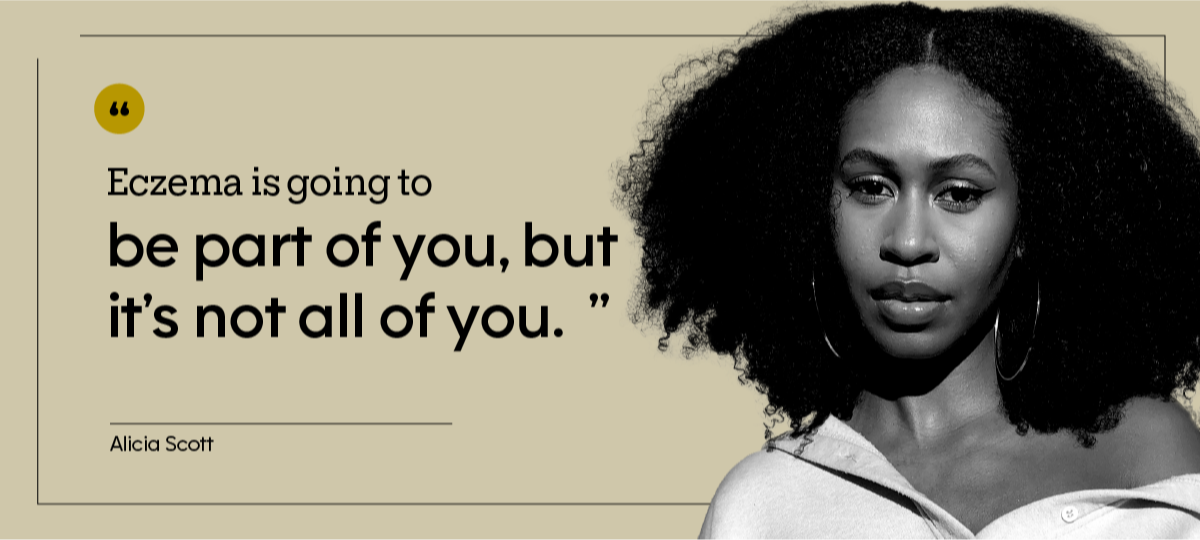
Alicia remembers frequently having issues with skin sensitivity as a young adult. But one incident in particular made her go see a specialist. One day at a department store, she caught sight of herself in a full-length mirror while trying on clothes. The harsh lights revealed that she had blotches all over her body. The sight made her start crying.
Alicia made an appointment with a dermatologist, who happened to be Black as well. That dermatologist diagnosed Alicia with atopic and contact dermatitis. She explained that factors like stress and diet can trigger symptoms.
At times, Alicia would wear long sleeves even in hot weather to hide her skin. She tried eating healthier and avoiding triggers like dairy. This helped, but sometimes she still felt like covering up skin blemishes. These experiences led her to create her own skincare line with ingredients that didn’t make her break out.
“There’s so much beauty in imperfection,” she says. It took her a while to understand that “eczema is going to be part of you, but it’s not all of you,” she says.
She still experiences symptoms, but she says she doesn’t let eczema stop her from living her life.
Sharing eczema experiences to feel less alone
Shiny Liu, a 22-year-old New Yorker, has dealt with eczema for the past 2 years.
It began as a small circular rash in the crease of her arm, which remained there for about a year. Though it was itchy, she didn’t think anything of it. But then the rash spread to patches behind her knees, on her neck, and on her foot. The more she scratched, the worse it got.
“I scratched it to the point where my skin was peeling off,” she says. “It didn’t look pleasant, and I was moisturizing it constantly. Nothing was really helping.”

Shiny got a prescription for a steroid cream, which helped temporarily. Learning to manage her stress and avoid other triggers also helped.
These days, she has flare-ups, but they never last more than a few days. She started posting about her experiences on social media. She says she hopes by sharing her experience she can help others with the condition feel less alone.
What does the doctor say?

Patricia Pinto-Garcia, MD, MPH
Medical Editor
Eczema is often described as "an itch that rashes" because of the intense discomfort it can cause. Inflammation from eczema can cause severe itching, burning, redness, and swelling. And when the skin becomes inflamed, it also generates heat, which makes the itching worse. Imagine feeling both itchy and hot simultaneously — it’s not a pleasant experience.
The real-life stories above demonstrate just how debilitating eczema can be. It can disrupt your sleep, make it difficult to focus on daily activities, and even affect your self-esteem because of changes in the appearance of your skin. Plus, eczema flares can increase the risk of skin infections and skin discoloration and texture changes.
Managing eczema can be challenging. It can help to read about other people’s experiences with the condition or get in touch with a support group that can provide insights into dealing with flare-ups. However, since eczema is an autoimmune condition, what works for one person may not work for another. Also, topical steroids, a common treatment for eczema, come with their own drawbacks, such as thinning and discoloration of the skin over time. Newer treatment options, such as JAK inhibitors and PDE4 inhibitors, are generally well-tolerated. But you may need to work with a dermatologist to get access to these treatment options, as not all primary care providers feel confident managing them.
Equipping yourself with the right tools can help you effectively manage your eczema in the long term, allowing you to stay comfortable and feel confident in your own skin.

Why trust our experts?






